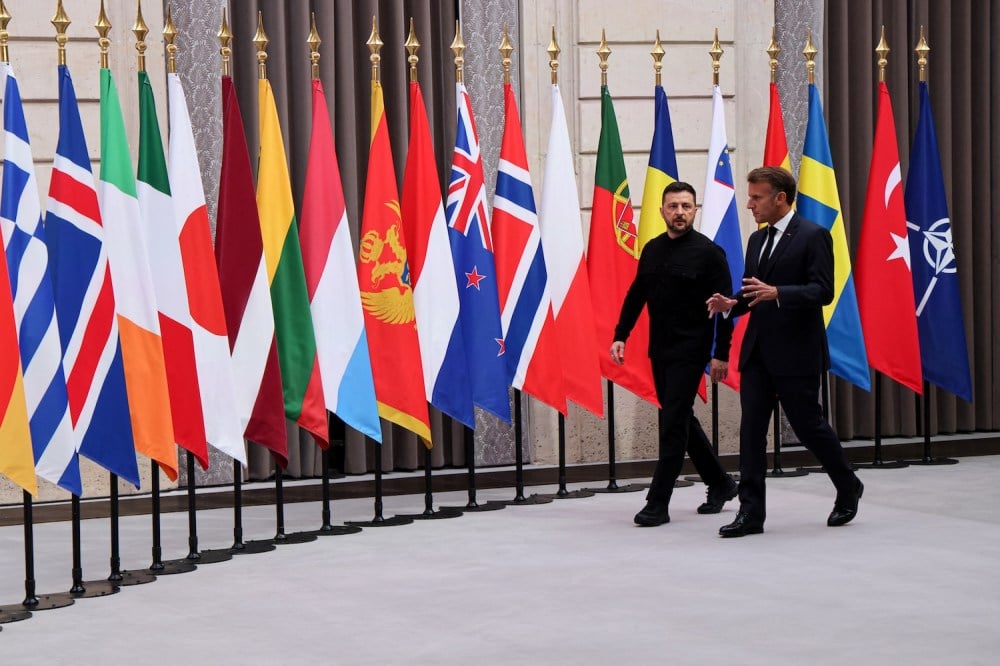Welcome back to World Brief, where we’re looking at Ukraine receiving security guarantee commitments from more than two dozen countries, a tight election race in Jamaica, and Bulgaria’s about-face on alleged Russian sabotage.
Pledging Security Guarantees
Twenty-six countries have “formally committed” to deploying forces to Ukraine as security guarantees in a future cease-fire or peace deal with Russia, French President Emmanuel Macron announced on Thursday. This so-called reassurance force would place troops on the ground, at sea, and in the air to “prevent any new major aggression.” They would not be sent to the front lines.
“This force does not seek to wage any war on Russia,” Macron said during a high-level meeting of the “coalition of the willing” in Paris on Thursday. Macron and British Prime Minister Keir Starmer co-chaired the summit, which Ukrainian President Volodymyr Zelensky also attended; this was Zelensky’s eighth trip to the French capital since Russia’s full-scale invasion of Ukraine began in February 2022.
Getting security guarantees has been a key priority of Ukraine’s, with Kyiv arguing that such a force is vital to ensure that Moscow does not renege on cease-fire promises or expand its territorial ambitions deeper into Europe. The Kremlin, however, remains opposed to “any scenarios that envisage the appearance in Ukraine of a military contingent with the participation of NATO countries.”
Last month, U.S. President Donald Trump expressed openness to potentially providing Ukraine with U.S. security guarantees during a major White House summit with Zelensky and seven other European leaders. During that meeting, several members of the European delegation referred to these guarantees as “Article 5” in style (a reference to NATO’s mutual defense clause). However, Trump clarified the next day that the United States would not contribute troops on the ground in Ukraine as part of any guarantee but would consider providing air support.
That week, U.S. Secretary of State Marco Rubio announced that Washington had begun coordinating with Kyiv and its European allies on a new security framework. And on Wednesday, Trump told Polish President Karol Nawrocki that Washington could increase its troop presence in Poland, which neighbors Russia.
It is unclear what this security framework may look like, but NATO Secretary-General Mark Rutte said last month that the agreement would bolster the Ukrainian military and provide U.S. and European guarantees aimed at deterring Russian aggression.
Thursday’s coalition of the willing dialogue also discussed strategies to force Russia to the negotiating table, both by strengthening sanctions on Moscow and finding opportunities to use frozen Russian assets to support Ukraine’s war effort. “I am confident that our alliance with Europe and the U.S. will help us increase pressure on Russia to move toward a diplomatic solution to this complex issue, which is so important for peace in Ukraine,” Zelensky said on Wednesday ahead of the summit, though he added that the Kremlin is “not showing any signals” that it wants to end the war.
Instead, Moscow appears focused on garnering foreign support to counteract Western attempts to make Russia a pariah on the world stage. On Thursday, North Korean leader Kim Jong Un pledged to “fully support” the Russian army as part of its “fraternal duty.” South Korea’s intelligence service estimated this week that Pyongyang plans to deploy another 6,000 troops to Russia.
Today’s Most Read
- China’s Military Is Now Leading by Sam Roggeveen
- Xi’s Pablum and Power by Sergey Radchenko
- How Fear Killed Liberalism by Stephen M. Walt
What We’re Following
Historic third term. Jamaican Prime Minister Andrew Holness secured a third term on Thursday following a tightly contested race the day before. Initial results show Holness’s Jamaica Labor Party winning at least 34 seats in the House of Representatives in comparison to the 29 seats clinched by the opposition People’s National Party. A total of 63 seats were up for grabs.
More than 2 million people were eligible to vote on the island, but official voter turnout hovered just above 39 percent—only slightly higher than during the country’s 2020 pandemic-era election.
Issues such as violent crime and economic inequity shaped this year’s vote. Holness campaigned on his success at reducing the homicide rate in Jamaica by 43 percent this year, the most significant decline in decades. He also pledged to double the current minimum wage to $200 per 40-hour workweek, and he vowed to prioritize employment and fiscal responsibility. The opposition, meanwhile, accused the Jamaica Labor Party of government mismanagement and promised to raise the income tax threshold to $21,800 to help middle-class Jamaicans.
Flip-flopping accusations. Allegations that Russia interfered with the GPS on a plane on Sunday carrying European Commission President Ursula von der Leyen became further muddled on Thursday, when Bulgaria appeared to backtrack on its initial accusations—only to reverse course a few hours later.
The Bulgarian Air Traffic Services Authority told the Financial Times on Monday that GPS navigation services aboard von der Leyen’s flight were jammed, forcing the aircraft’s pilots to rely on paper maps to land. Several European officials have accused Moscow of being behind the attack, including European Commission deputy chief spokesperson Arianna Podestà.
But on Thursday, Bulgarian Prime Minister Rosen Zhelyazkov told lawmakers that the plane was not sabotaged and instead experienced a partial signal interruption, which can occur when flying over densely populated areas. Transport Minister Grozdan Karadzhov also denied any evidence of interference.
Within a few hours, though, Zhelyazkov held a press conference to revert to his original stance, saying, “There was a mess of information with questions, facts, and the circumstances interpreted in a way that was intended to hurt the Bulgarian institutions.” He added that just because ground instruments did not detect any jamming does not mean that no such sabotage occurred aboard the aircraft.
Tragedy in Lisbon. A popular funicular railcar derailed in Lisbon on Wednesday, killing at least 16 people and injuring at least 21 others, some of whom remain in critical condition. The Glória Funicular cable car, which connects the Portuguese city’s downtown with its Bairro Alto upper quarter, overturned around 6:15 p.m. local time and crashed into a building.
An investigation is underway to determine what caused the incident, though video footage appears to show the railcar losing control. “The city needs answers,” Lisbon Mayor Carlos Moedas said. The Glória elevator is one of Lisbon’s three traditional cable cars, which run up and down the city’s steep hillsides. According to Lisbon’s town hall, the railcar carries around 3 million people each year. Workers have reported cable car maintenance issues several times in recent years.
The Portuguese government declared Thursday to be a national day of mourning. “The Government and the Prime Minister deeply regret the accident that occurred this afternoon in the Glória elevator in Lisbon, and express their deep consternation and solidarity with the victims and their families,” the office of Portuguese Prime Minister Luís Montenegro said in a statement on Wednesday.
Odds and Ends
Even world leaders worry about growing old. Chinese President Xi Jinping and Russian President Vladimir Putin were caught discussing the concept of living forever while viewing Beijing’s “Victory Day” military parade on Wednesday. “There’ll be constant transplants of human organs, and maybe even people will grow younger as they age—even achieving immortality,” Putin told Xi via a translator. Xi’s response: “It could be that in this century, humans might be able to live to 150 years old.” Hopefully, they have good health care to support that.
The post 26 Countries Commit to Deploying Troops to Ukraine Postwar appeared first on Foreign Policy.




